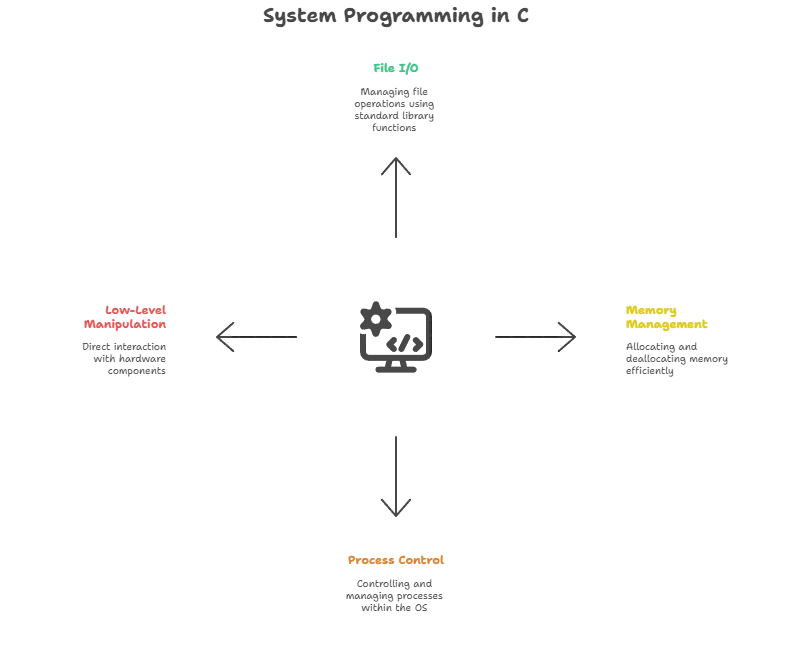System Programming
System programming in C involves writing programs that interact directly with the operating system (OS) and hardware components. It deals with tasks such as file I/O, memory management, process control, and low-level manipulation. Understanding system programming is essential for developing efficient, reliable, and secure software.
File I/O Operations
File Input/Output (I/O) is fundamental in system programming for reading from and writing to files. C provides standard library functions like fopen, fclose, fread, fwrite, etc., for file operations.
#include <stdio.h>
int main() {
FILE *fp;
char c;
fp = fopen("file.txt", "r"); // Open file for reading
if (fp == NULL) {
printf("Error opening file\n");
return 1;
}
while ((c = fgetc(fp)) != EOF) // Read character until end-of-file
printf("%c", c);
fclose(fp); // Close file
return 0;
}
Output (if “file.txt” contains “Hello, World!”)
// output //
Hello, World!

Process Control
System programming involves managing processes, which are instances of executing programs. C provides functions like fork, exec, and wait for process control.
#include <stdio.h>
#include <unistd.h>
int main() {
pid_t pid;
pid = fork(); // Create a new process
if (pid == 0) {
// Child process
printf("Child process\n");
} else if (pid > 0) {
// Parent process
printf("Parent process\n");
} else {
// Error
printf("Error creating process\n");
}
return 0;
}
// output //
Parent process
Child process
Memory Management
Memory management is crucial for efficient resource utilization. C provides functions like malloc, calloc, realloc, and free for dynamic memory allocation and deallocation.
#include <stdio.h>
#include <stdlib.h>
int main() {
int *ptr;
// Allocate memory for 5 integers
ptr = (int*)malloc(5 * sizeof(int));
if (ptr == NULL) {
printf("Memory allocation failed\n");
return 1;
}
// Use the allocated memory
for (int i = 0; i < 5; i++)
ptr[i] = i;
// Free the allocated memory
free(ptr);
return 0;
}
Low-Level Manipulation
System programming often requires low-level manipulation of data and hardware. C provides features like pointers, bitwise operations, and inline assembly for such tasks.
#include <stdio.h>
int main() {
int a = 10, b = 20;
// Bitwise AND operation
int result = a & b;
printf("Result: %d\n", result);
return 0;
}
// output //
Result: 0
Interprocess Communication
Interprocess communication (IPC) facilitates communication and data exchange between processes. C provides mechanisms like pipes, shared memory, and message queues for IPC.
#include <stdio.h>
#include <unistd.h>
int main() {
int pipefd[2];
pid_t pid;
char buffer[20];
// Create pipe
if (pipe(pipefd) == -1) {
perror("pipe");
return 1;
}
// Create child process
pid = fork();
if (pid == 0) {
// Child process
close(pipefd[1]); // Close write end
read(pipefd[0], buffer, sizeof(buffer)); // Read from pipe
printf("Child received: %s\n", buffer);
close(pipefd[0]); // Close read end
} else if (pid > 0) {
// Parent process
close(pipefd[0]); // Close read end
write(pipefd[1], "Hello from parent", 17); // Write to pipe
close(pipefd[1]); // Close write end
} else {
// Error
perror("fork");
return 1;
}
return 0;
}
// output //
Child received: Hello from parent
Error Handling
Error handling is crucial in system programming to handle unexpected situations gracefully. C provides mechanisms like perror and errno for error reporting and handling.
#include <stdio.h>
#include <errno.h>
int main() {
FILE *fp;
fp = fopen("nonexistent.txt", "r");
if (fp == NULL) {
perror("Error opening file");
printf("Error code: %d\n", errno);
return 1;
}
return 0;
}
Output (if “nonexistent.txt” doesn’t exist)
// output //
Error opening file: No such file or directory
Error code: 2
System Calls
System calls are fundamental interfaces provided by the operating system for applications to interact with the kernel. They provide a way for user-space programs to request services from the kernel, such as I/O operations, process management, and resource allocation. System calls bridge the gap between user-level code and the privileged kernel mode.
In C, system calls can be invoked directly using the syscall function. The syscall function takes a system call number and any required arguments, then executes the corresponding system call.
Let’s delve deeper into system calls with more code examples, explanations, and their outputs.
Example 1: Reading from Standard Input using System Call
#include <stdio.h>
#include <unistd.h>
#include <sys/syscall.h>
int main() {
char buffer[50];
// Read system call (reads from standard input)
syscall(SYS_read, 0, buffer, 50);
printf("You entered: %s\n", buffer);
return 0;
}
Explanation:
#include <unistd.h>: This header file provides access to various symbolic constants, types, and function declarations for POSIX operating systems. It includes the declaration of thesyscallfunction.#include <sys/syscall.h>: This header file contains system call numbers for various architectures. TheSYS_readconstant represents the system call number for reading.syscall(SYS_read, 0, buffer, 50): This line invokes thereadsystem call. The first argument is the system call number (SYS_read), followed by the file descriptor (0for standard input), buffer to store the read data, and the number of bytes to read.
// output //
Upon running the program, it waits for user input. After entering some text and pressing Enter, it displays the entered text.
Example 2: Writing to Standard Output using System Call
#include <stdio.h>
#include <unistd.h>
#include <sys/syscall.h>
int main() {
char buffer[] = "Hello, World!\n";
// Write system call (writes to standard output)
syscall(SYS_write, 1, buffer, sizeof(buffer) - 1);
return 0;
}
Explanation:
syscall(SYS_write, 1, buffer, sizeof(buffer) - 1): This line invokes thewritesystem call. The first argument is the system call number (SYS_write), followed by the file descriptor (1for standard output), buffer containing the data to write, and the number of bytes to write (sizeof(buffer) - 1to exclude the null terminator).
// output //
The program prints "Hello, World!" to the standard output.
System programming in C offers powerful tools for interacting with the underlying system and hardware. Understanding file I/O, process control, memory management, and low-level manipulation is essential for developing efficient and robust software. Mastery of these concepts empowers programmers to create high-performance applications and system utilities. Regular practice and exploration of advanced topics further enhance skills in system programming.Happy coding!❤️
